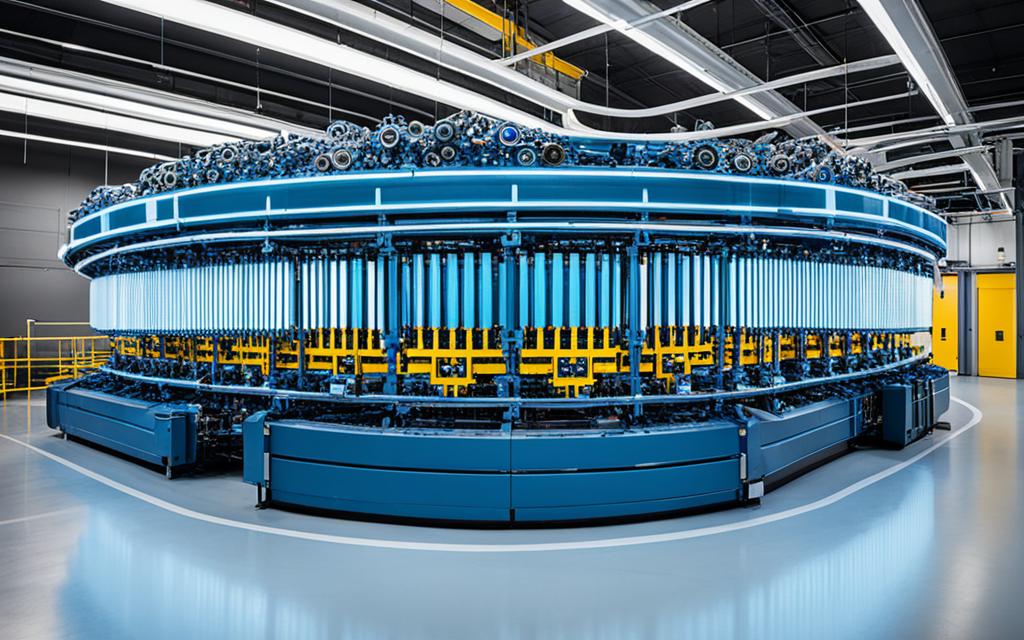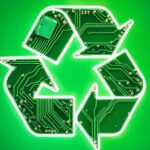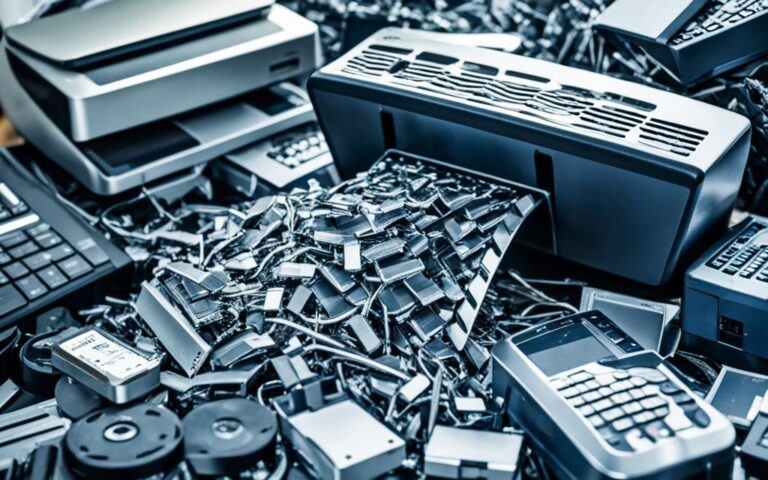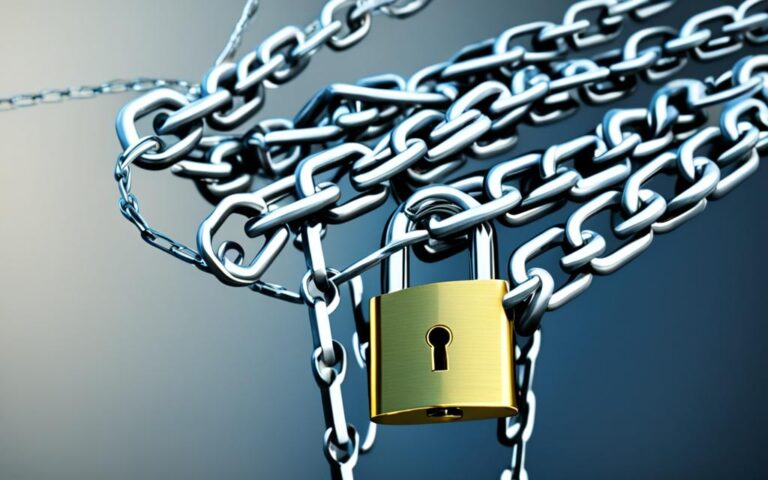Innovations in Data Recycling for IT Security
In today’s rapidly evolving technological landscape, responsible disposal of servers and network equipment is imperative for both environmental and data security reasons. This article explores cutting-edge methods and strategies in server and network recycling, including advanced data wiping techniques, material recovery and reusability, eco-friendly disposal methods, automation and AI in e-waste management, and the importance of regulatory compliance and certification in selecting a recycling company.
As technology continues to advance, the need for secure and sustainable data recycling solutions becomes increasingly important. The efficient disposal of servers and network equipment not only safeguards sensitive data but also contributes to a greener and more environmentally friendly IT industry.
With innovations in data wiping techniques, companies can now ensure the complete removal of sensitive information from retired devices, making it virtually impossible for unauthorized individuals to access or retrieve the data. Additionally, material recovery and reusability enable valuable resources to be extracted from old equipment, reducing the need for virgin materials and promoting a circular economy.
Eco-friendly disposal methods further minimize the environmental impact of e-waste, employing biodegradable materials and sustainable solvents. Automation and AI technology streamline the recycling process, enhancing efficiency and accuracy in sorting and separating different materials.
When choosing a recycling company, regulatory compliance and certification should be a top priority. Certifications such as ISO 14001 and e-Stewards indicate adherence to international standards for environmental management and data security.
By adopting these sustainable solutions, businesses and data centers can contribute to a secure and environmentally conscious IT landscape. Stay tuned for the upcoming sections of this article, where we delve deeper into the importance of data security, material recovery, eco-friendly disposal methods, automation and AI, and the significance of reputation and reviews when selecting a recycling company.
To learn more about server recycling in the UK, visit server recycling uk.
The Importance of Data Security in Server and Network Recycling
Data security is an essential aspect of server and network recycling. As organizations upgrade their IT infrastructure, ensuring that sensitive data is permanently removed becomes paramount. This not only mitigates the risk of data breaches but also contributes to sustainable and responsible electronic waste management.
Innovative approaches to data security in server and network recycling involve the use of advanced data wiping techniques. Military-grade data wiping software, conforming to international security standards such as NIST 800-88, is employed to ensure the complete eradication of sensitive information. This software employs robust algorithms that effectively overwrite data, making it impossible for unauthorized users to recover.
“By utilizing military-grade data wiping software, organizations can confidently recycle servers and network equipment, knowing that their sensitive data has been securely eradicated.”
These data wiping techniques go beyond simple deletion or formatting of storage devices. They involve multiple passes or random data patterns to obliterate all remnants of data. With such meticulous data erasure, businesses can systematically recycle their servers and network equipment without compromising data privacy or exposing themselves to potential security risks.
Implementing stringent data wiping techniques not only safeguards confidential information but also honors regulatory requirements. Data protection regulations, such as the General Data Protection Regulation (GDPR) and sector-specific legislation, demand the responsible handling and disposal of personal or sensitive data. Through the secure disposal of servers and network equipment, organizations can remain in compliance with these regulations, avoiding legal penalties and reputational damage.
To illustrate the significance of data security in server recycling, consider the following:
| Case Study | Data Security Measures | Outcome |
|---|---|---|
| ABC Corporation | Military-grade data wiping software | No data breaches reported after server recycling |
| XYZ Enterprises | No data wiping techniques used | Data breach occurred, leading to financial and reputational losses |
| 123 Tech Solutions | State-of-the-art data wiping techniques | Data securely eradicated, achieving regulatory compliance |
Through effective data wiping techniques, organizations can confidently embrace server and network recycling while prioritizing data security. By partnering with reputable recycling companies that adhere to international standards and certifications, businesses can ensure the highest level of data protection and contribute to a sustainable IT ecosystem.
Expert Insight:
“Organizations must recognize that data security continues to play a pivotal role in server and network recycling. By adopting robust data wiping techniques, businesses can effectively protect sensitive information and demonstrate their commitment to responsible e-waste management.”
Material Recovery and Reusability in Server and Network Recycling
Material recovery and reusability are vital components of server and network recycling. By employing advanced sorting technologies, such as spectrometry and magnetic separation, valuable materials like gold, copper, and rare earth elements can be extracted from old servers and network equipment. These materials have the potential to be reused in the manufacturing of new electronic products, driving the development of a more sustainable circular economy.
“Through innovative sorting techniques, we can separate valuable materials from discarded servers and network equipment, significantly reducing the dependency on finite resources. This not only benefits the environment but also contributes to the creation of a more sustainable and resource-efficient future.”
In the journey towards a more environmentally conscious IT industry, the concept of material recovery and reusability holds immense potential. By diverting these materials from the waste stream and reintroducing them into the production cycle, we can minimize the extraction of raw materials and reduce the carbon footprint associated with manufacturing new electronic devices.
Furthermore, the reusability of recovered materials promotes a more sustainable approach to resource management, ensuring the longevity and availability of these valuable components. By incorporating recycled materials into the manufacturing process, businesses can demonstrate their commitment to environmental stewardship and contribute to the preservation of natural resources.
Advantages of Material Recovery and Reusability:
- Reduces the need for raw material extraction
- Minimizes carbon emissions associated with manufacturing
- Preserves valuable resources for future generations
- Aligns with the principles of a circular economy
Through the implementation of innovative recycling practices, the IT sector can effectively address the environmental challenges posed by electronic waste. Material recovery and reusability play a pivotal role in this endeavor, offering a sustainable solution that benefits both businesses and the planet.
| Material | Potential Uses |
|---|---|
| Gold | Jewelry, electronics, dental applications |
| Copper | Wiring, plumbing, electrical components |
| Rare Earth Elements | Renewable energy technologies, magnets, electronics |
Eco-Friendly Disposal Methods in Server and Network Recycling
As environmental concerns continue to rise, the search for eco-friendly disposal methods in server and network recycling grows more urgent. Companies are now embracing sustainable practices by using biodegradable materials and eco-friendly solvents for components that cannot be recycled. This not only reduces the overall environmental impact of e-waste but also sets an example for other industries to follow.
Eco-friendly disposal methods play a crucial role in mitigating the harmful effects of electronic waste on our planet. By utilizing biodegradable materials, companies ensure that the discarded components break down naturally over time, minimizing their long-term impact on the environment.
Additionally, eco-friendly solvents are being employed to safely dispose of non-recyclable components. These solvents are designed to have minimal environmental impact while effectively neutralizing any potentially hazardous substances. By choosing eco-friendly solvents over traditional methods, companies can minimize their carbon footprint and contribute to a cleaner, greener future.
Benefits of Eco-Friendly Disposal Methods
The adoption of eco-friendly disposal methods in server and network recycling offers several key benefits:
- Environmental Preservation: By using biodegradable materials and eco-friendly solvents, companies actively contribute to the preservation of natural resources and the reduction of pollution.
- Promotion of Circular Economy: Sustainable disposal methods allow for the recovery of valuable materials, fostering a circular economy where resources are recycled and reused, rather than discarded.
- Compliance with Environmental Standards: Implementing eco-friendly practices ensures compliance with local and international environmental regulations, promoting a responsible approach to waste management.
- Positive Corporate Image: By prioritizing sustainability, companies can showcase their commitment to environmental stewardship, enhancing their reputation and attracting environmentally conscious customers.
Embracing eco-friendly disposal methods in server and network recycling leads to a win-win scenario, benefiting both the environment and businesses alike. By reducing the environmental impact of e-waste and setting a precedent for responsible waste management, companies can pave the way for a more sustainable future.
| Advantages of Eco-Friendly Disposal Methods | Impact |
|---|---|
| Environmental Preservation | Minimizes pollution and conserves natural resources. |
| Promotion of Circular Economy | Facilitates material recovery and promotes resource reusability. |
| Compliance with Environmental Standards | Ensures adherence to local and international waste management regulations. |
| Positive Corporate Image | Cultivates a reputation for sustainability and attracts environmentally conscious customers. |
Automation and AI in E-Waste Management
The advent of automation and artificial intelligence (AI) is revolutionizing e-waste management. Automated sorting lines equipped with AI algorithms can accurately identify and separate different materials, making the recycling process faster, more efficient, and reliable. By minimizing human error and increasing precision, automation and AI technologies are transforming the way we handle e-waste.
With automation, repetitive tasks such as sorting and categorizing can be performed at a much higher speed, reducing labor costs and increasing overall productivity. AI algorithms can analyze vast amounts of data to make intelligent decisions on material identification and separation, ensuring the most effective recycling processes are implemented.
“Automation and AI technologies in e-waste management not only streamline operations but also contribute to a more sustainable and environmentally friendly approach. By optimizing the recycling process, we can minimize waste and efficiently recover valuable resources.”
One of the key benefits of automation and AI in e-waste management is the improved accuracy in material identification. This allows for a higher recovery rate of valuable metals and materials, reducing the need for mining and extraction of finite resources.
Moreover, automation and AI technologies enable real-time monitoring and control of recycling operations, providing valuable insights into the efficiency, resource utilization, and environmental impact of the processes. This data-driven approach allows for continuous improvement and the implementation of more sustainable practices.
The Future of Automation and AI in E-Waste Management
As technology advancements continue, automation and AI will play an even greater role in e-waste management. We can expect enhanced machine learning capabilities, enabling systems to become more intelligent in material identification and separation. This will further optimize recycling processes and improve resource recovery.
Furthermore, automation and AI technologies will enable better traceability and transparency in the recycling journey of e-waste. With advanced tracking systems, it will be possible to monitor the entire lifecycle of electronic devices, from production to disposal. This will facilitate better decision-making and accountability in the responsible management of e-waste.
Overall, automation and AI are transforming the landscape of e-waste management, paving the way for a more sustainable future. By harnessing the power of technology, we can efficiently recycle electronic waste, reduce the environmental impact, and preserve valuable resources for future generations.
Advantages of Automation and AI in E-Waste Management
- Increased sorting accuracy, leading to higher resource recovery rates
- Improved operational efficiency and productivity
- Real-time monitoring and control for better process optimization
- Reduced environmental impact by minimizing waste and extraction of finite resources
- Enhanced traceability and accountability in the recycling journey
Regulatory Compliance and Certification in Server and Network Recycling
In the realm of server and network recycling, regulatory compliance and certification play a fundamental role in selecting a reputable and trustworthy recycling company. When businesses or data centers consider recycling their equipment, it is essential to ensure that the chosen company adheres to international standards for environmental management and data security. This adherence provides peace of mind and reassurance regarding the ethical and secure handling of sensitive information, preventing any potential data breaches or environmental harm.
One crucial certification that businesses should look for is the ISO 14001 certification. This certification sets international standards for environmental management systems, ensuring that the recycling processes employed by the company are environmentally responsible and sustainable. By recycling servers and network equipment through an ISO 14001 certified company, businesses can actively contribute to reducing electronic waste and promoting a more circular economy.
Another certification that signifies a recycling company’s reliability is the e-Stewards certification. This certification guarantees that the company operates in compliance with the highest standards of responsible recycling, data security, and social and worker safety. It assists in safeguarding against the export of hazardous electronic waste to developing countries and ensures the use of proper recycling practices.
Advantages of Choosing a Certified Recycling Company:
- Environmental Responsibility: Certified recycling companies follow environmentally friendly practices and ensure proper disposal and recycling of electronic waste, minimizing the negative impact on the environment.
- Data Security: Adherence to data security standards prevents unauthorized access to sensitive information, safeguarding businesses and data centers from potential data breaches and legal repercussions.
- Compliance with Regulations: By choosing a certified recycling company, businesses can rest assured that they are in compliance with relevant regulations and legal requirements, mitigating the risk of non-compliance fines or penalties.
- Reputation and Trust: Working with a certified recycling company enhances a business’s reputation and builds trust with stakeholders, showcasing commitment to sustainable practices and responsible environmental stewardship.
When considering server and network recycling, it is crucial to prioritize regulatory compliance and certification to ensure the safe, ethical, and environmentally responsible management of electronic waste. By partnering with ISO 14001 or e-Stewards certified recycling companies, businesses and data centers can demonstrate their commitment to regulatory compliance, data security, and sustainable practices.
“Choosing a recycling company with the right certifications provides peace of mind knowing that data security and environmental responsibility are top priorities.”
Comparison of ISO 14001 and e-Stewards Certifications
| ISO 14001 | e-Stewards | |
|---|---|---|
| Focus | Environmental management system | Responsible recycling, data security, social and worker safety |
| International Recognition | Recognized worldwide | Recognized in North America |
| Electronic Waste Management | Sets standards for environmental responsibility and sustainability | Ensures hazardous e-waste is not exported to developing countries |
| Data Security | Does not explicitly focus on data security | Address data security and privacy requirements |
| Worker Safety | Does not explicitly address worker safety | Focuses on ensuring the safety of workers handling e-waste |
Reputation and Reviews in Selecting a Recycling Company
When it comes to selecting a recycling company for server and network recycling, evaluating their reputation and reviews is crucial. By considering the experiences and feedback of other customers, you can ensure that you choose a company that offers reliable and high-quality services.
A strong reputation is often an indicator of a recycling company’s expertise and commitment to customer satisfaction. Look for testimonials from satisfied clients, both on the company’s website and on trusted review platforms. Positive reviews and ratings can provide valuable insights into the company’s professionalism, reliability, and attention to detail.
“I was impressed by the outstanding service provided by XYZ Recycling. They were reliable, efficient, and handled our server recycling needs with utmost care. Highly recommended!” – John Smith, CEO of ABC Company
Industry accolades and certifications are also valuable factors to consider. These accolades and certifications demonstrate that the recycling company adheres to industry standards for environmental management and data security. Look for certifications such as ISO 14001 or e-Stewards, which ensure responsible and compliant recycling practices.
By conducting thorough research and considering the reputation, reviews, and certifications of recycling companies, you can make an informed decision and choose a partner that specializes in server and network recycling. This will not only contribute to a more sustainable IT landscape but also ensure the secure and responsible disposal of your equipment.
| Factors to Consider | Reputation | Reviews | Certifications |
|---|---|---|---|
| Description | Assess the company’s overall reputation in the industry | Consider feedback from previous customers | Look for relevant certifications and accreditations |
| Importance | Indicates company’s expertise and professionalism | Provides insights into customer satisfaction | Ensures adherence to industry standards |
| Examples | Positive testimonials, online presence | Customer reviews, ratings on trusted platforms | ISO 14001, e-Stewards certifications |
Remember that reputation and reviews are just two of the many factors to consider when selecting a recycling company for your server and network recycling needs. By thoroughly evaluating and comparing different companies based on their reputation, reviews, certifications, and other relevant factors, you can make an informed decision and choose a trusted partner for your recycling requirements.
Conclusion
Innovations in data recycling for IT security are revolutionizing the way we manage and dispose of data. It is critical for businesses and data centers to prioritize responsible server and network recycling to address environmental concerns and safeguard sensitive information. With advanced data wiping techniques, material recovery and reusability methods, eco-friendly disposal approaches, automation and AI in e-waste management, and adherence to regulatory compliance and certification, sustainable solutions can be embraced.
By adopting these practices, businesses and data centers not only contribute to a more secure IT landscape but also play a crucial role in preserving our environment. The use of military-grade data wiping software ensures that sensitive data is permanently deleted, mitigating the risk of unauthorized access. Material recovery and reusability techniques enable valuable materials to be reclaimed, promoting a circular economy and reducing the need for resource extraction.
Eco-friendly disposal methods minimize the environmental impact of e-waste, showcasing the commitment towards sustainability. Automation and AI streamline the recycling process, making it more efficient, reliable, and error-free. Regulatory compliance and certification provide assurance that data recycling is carried out in line with international standards, instilling confidence in businesses and data centers.
By embracing these innovations and practices, the IT industry can make significant strides towards a more secure and environmentally friendly future. To learn more about server recycling in the UK, visit Server Recycling UK.
FAQ
What is data recycling?
Data recycling refers to the process of securely disposing of servers and network equipment while ensuring the responsible handling of sensitive data. It involves techniques such as data wiping and material recovery for sustainable solutions.
Why is data security important in server and network recycling?
Data security plays a crucial role in server and network recycling to protect sensitive information from unauthorized access or data breaches. Advanced data wiping techniques ensure that all sensitive data is permanently deleted, making it impossible to recover.
What is material recovery and reusability in server and network recycling?
Material recovery and reusability involve the process of separating and recovering valuable materials from old servers and network equipment. Advanced sorting technologies are used to extract materials like gold, copper, and rare earth elements, which can then be reused in the manufacturing of new electronic products.
What are eco-friendly disposal methods in server and network recycling?
Eco-friendly disposal methods in server and network recycling focus on reducing the environmental impact of electronic waste. Companies are now using biodegradable materials and eco-friendly solvents for components that cannot be recycled, setting a precedent for other industries to follow.
How is automation and AI used in e-waste management?
Automation and artificial intelligence (AI) are revolutionizing e-waste management. Automated sorting lines equipped with AI algorithms can accurately identify and separate different materials, making the recycling process more efficient and reliable while minimizing human error.
Why is regulatory compliance and certification important in server and network recycling?
Regulatory compliance and certification ensure that a recycling company adheres to international standards for environmental management and data security. Certifications like ISO 14001 or e-Stewards indicate a company’s commitment to responsible recycling practices, providing peace of mind to businesses and data centers.
How can I gauge the reputation and credibility of a recycling company?
To gauge the reputation and credibility of a recycling company, look for customer testimonials, online reviews, and industry accolades. A strong reputation often signifies a high level of expertise and customer satisfaction in providing server and network recycling services.
How does responsible server and network recycling contribute to a more secure and environmentally friendly IT landscape?
Responsible server and network recycling address environmental concerns and ensure data security. Through advanced data wiping techniques, material recovery and reusability, eco-friendly disposal methods, automation and AI in e-waste management, and regulatory compliance and certification, businesses and data centers can adopt sustainable practices and contribute to a more secure and environmentally friendly IT landscape.













